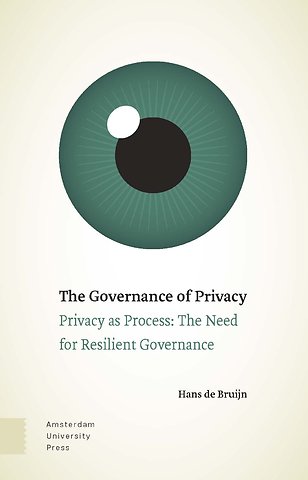

Prof. dr. Hans de Bruijn is hoogleraar bestuurskunde aan de Faculteit Techniek, Bestuur en Management van de Technische Universiteit Delft. Hij is daarnaast onder andere verbonden aan de Nederlandse School voor Openbaar Bestuur in Den Haag en programmaleider Governance aan het Netherlands Institute for City Innovation Studies.
Foto, Sake Elzinga
Meer over Hans de BruijnThe Governance of Privacy
Privacy as Process: The Need for Resilient Governance
E-book Epub met watermerkbeveiliging Engels 2021 1e druk 9789048556120Samenvatting
We can hardly underestimate the importance of privacy in our data-driven world. Privacy breaches are not just about disclosing information. Personal data is used to profile and manipulate us – sometimes on such a large scale that it affects society as a whole. What can governments do to protect our privacy?
In 'The Governance of Privacy' Hans de Bruijn first analyses the complexity of the governance challenge, using the metaphor of a journey. At the start, users have strong incentives to share data. Harvested data continue the journey that might lead to a privacy breach, but not necessarily – it can also lead to highly valued services. That is why both preparedness at the start of the journey and resilience during the journey are crucial to privacy protection.
The book then explores three strategies to deal with governments, the market, and society. Governments can use the power of the law; they can exploit the power of the market by stimulating companies to compete on privacy; and they can empower society, strengthening its resilience in a data-driven world.
Trefwoorden
privacy governance databeveiliging digitale privacy dataprotectie overheid resilience big data marktwerking regulering datagebruik samenleving profilering manipulatie datajourney empowerment collectieve privacy technologie resilient governance bedrijfsmodellen upstream protection dataprijzing gebruikersperspectief locking-out databescherming downstream protection privacycompetitie locking-in privacy by design procedurale regulering
Trefwoorden
Specificaties
Lezersrecensies
Inhoudsopgave
1.1 Introduction 7
1.2 Privacy as a process (I) 9
1.3 Type 1: privacy invasions as disclosure – continuous, ubiquitous, and emergent 15
1.4 Type 2: privacy invasions as profiling 18
1.5 Type 3: privacy invasion as manipulation 23
1.6 Type 4: privacy invasion as a collective problem 27
1.7 Privacy as a process (II): comparing the four types of privacy invasions 30
2 The Complexity of the Governance Challenge 33
2.1 Introduction 33
2.2 Victims and their many cost–benefit analyses 34
2.3 The object: data and the many uncertainties concerning data use 37
2.4 The spaghetti-like network of data-producing devices 40
2.5 The villain comes in many guises 43
2.6 Distribution cannot be distinguished from production 47
2.7 The addressee as victim and villain 49
2.8 The essence of the differences between then and now 51
2.9 The complexity of the governance challenge, summarized 53
3 An Introduction to Governance 55
3.1 Introduction 55
3.2 State, market, and society 55
3.3 The context and the inevitable unintended effects 59
3.4 The dynamics of underlying norms 61
3.5 When to use instruments: upstream or downstream? 64
3.6 Resilient governance 74
4 The Power of the State 79
4.1 Introduction 79
4.2 From prescriptive- to goal-based regulation 79
4.3 From substantive regulation to procedural regulation 85
4.4 From imposed to negotiated regulation 89
4.5 From direct to indirect regulation 95
4.6 From instrumental to institutional regulation 99
4.7 The essence of resilience-based regulation 103
4.8 Conditions for regulation based on resilience-capacity and infrastructure building 105
5 The Power of the Market 109
5.1 Introduction 109
5.2 Competing on privacy 110
5.3 The pricing and taxing of data 115
5.4 Challenging the business proposition and, therefore, the business model 126
5.5 Creating barriers in the data-journey—breaking up companies 133
5.6 The power of the market and resilience 142
6 The Power of Society 145
6.1 Introduction 145
6.2 Empowerment upstream 145
6.3 Patterns: locking-in and locking-out 154
6.4 Empowerment downstream: how can a user weaponize against locking-in and locking-out? 168
6.5 Resilience and the role of government 179
7 Reflections 181
References 187
Anderen die dit e-book kochten, kochten ook
Rubrieken
- advisering
- algemeen management
- coaching en trainen
- communicatie en media
- economie
- financieel management
- inkoop en logistiek
- internet en social media
- it-management / ict
- juridisch
- leiderschap
- marketing
- mens en maatschappij
- non-profit
- ondernemen
- organisatiekunde
- personal finance
- personeelsmanagement
- persoonlijke effectiviteit
- projectmanagement
- psychologie
- reclame en verkoop
- strategisch management
- verandermanagement
- werk en loopbaan





